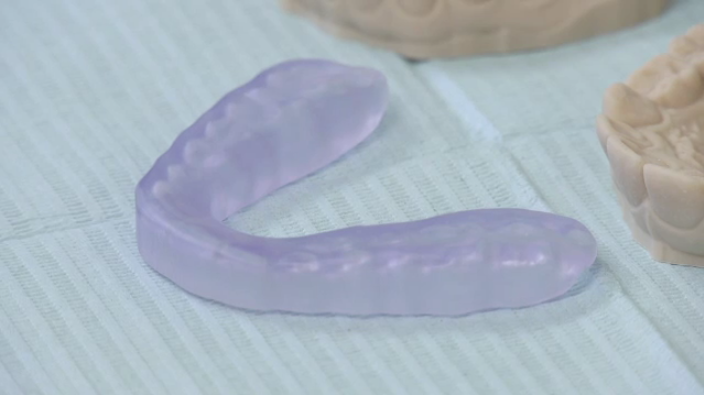'Dramatic' increase in teeth clenching, grinding during pandemic: dentist
 Dentist Scott Leckie believes a major cause in the rise in cases of the dental condition bruxism is stress. (Source: Michelle Gerwing/CTV News Winnipeg)
Dentist Scott Leckie believes a major cause in the rise in cases of the dental condition bruxism is stress. (Source: Michelle Gerwing/CTV News Winnipeg)
Many of us have suffered from tension headaches or know someone who has dealt with the painful condition.
One Manitoba dentist says the culprit of this common type of headache could be bruxism - a dental condition that is being diagnosed more and more frequently.
“It’s because you’re squeezing the jaw and that's where the muscles and the tension headache come from, but you are wearing your teeth at the same time,” said Dr. Scott Leckie, dentist and president of the Manitoba Dental Association.
Dr. Leckie said bruxism, which is clenching or grinding your teeth, happens when you are sleeping or in deep concentration and you do not catch yourself doing it.
He said it can cause many issues, like muscle pain, joint pain, loosening of your teeth and destruction of the supportive structures like gums and bone.
It appears to be a pressing issue south of the border, too. According to a recent Consumer Report, American Dental Association statistics showed the number of patients reporting these symptoms has increased by 69 per cent since 2020.
“International studies, Canadian studies, have shown that that has increased over the COVID pandemic,” said Dr. Leckie.
While the actual prevalence may be hard to gauge, he said, the increase in diagnosis has been ‘dramatic’ and the major link to the climb in cases is stress.
"With the stress levels going up, so does the bruxism, clenching and grinding," he said. "Certainly as you get stressed, you're tense. You start squeezing muscles, and the easy one to just do is your jaw."
Dr. Leckie said some people clench and grind for a long time before they notice any symptoms and decide to bring it up with a dentist.
"You start seeing a lot of people complaining about headaches and sensitivity in their teeth that lasts a little bit longer than the normal sensitivity."
He added people can also notice muscle pain on the side of their face and even up to the top of their head.
Bruxism is treatable, and Dr. Leckie said there are several different options starting with heat therapy and stretching. Patients can also get physiotherapy or use medication like pain killers, anti-inflammatories or muscle relaxants. In some cases he said Botox can help relax muscle movement, but what works ‘fabulously’ are nighttime mouth guards.
 Night time mouth guards, like the one pictured here that Dr. Leckie 3D printed in his office, can be an effective treatment option for bruxism. (Source: Michelle Gerwing/CTV News Winnipeg)
Night time mouth guards, like the one pictured here that Dr. Leckie 3D printed in his office, can be an effective treatment option for bruxism. (Source: Michelle Gerwing/CTV News Winnipeg)
“If you don’t treat it or if you ignore it for too long, you'll see things like long-term pain arthritis in the joint, the TM joint which is just in front of your ear."
He said teeth can also break because of the constant stress.
Both Dr. Leckie and Consumer Reports say scheduling a visit with your dentist can help figure out how severe your case may be and what’s the best action plan.
CTVNews.ca Top Stories

BREAKING Donald Trump picks former U.S. congressman Pete Hoekstra as ambassador to Canada
U.S. president-elect Donald Trump has nominated former diplomat and U.S. congressman Pete Hoekstra to be the American ambassador to Canada.
Genetic evidence backs up COVID-19 origin theory that pandemic started in seafood market
A group of researchers say they have more evidence to suggest the COVID-19 pandemic started in a Chinese seafood market where it spread from infected animals to humans. The evidence is laid out in a recent study published in Cell, a scientific journal, nearly five years after the first known COVID-19 outbreak.
This is how much money you need to make to buy a house in Canada's largest cities
The average salary needed to buy a home keeps inching down in cities across Canada, according to the latest data.
'My two daughters were sleeping': London Ont. family in shock after their home riddled with gunfire
A London father and son they’re shocked and confused after their home was riddled with bullets while young children were sleeping inside.
Smuggler arrested with 300 tarantulas strapped to his body
Police in Peru have arrested a man caught trying to leave the country with 320 tarantulas, 110 centipedes and nine bullet ants strapped to his body.
Boissonnault out of cabinet to 'focus on clearing the allegations,' Trudeau announces
Prime Minister Justin Trudeau has announced embattled minister Randy Boissonnault is out of cabinet.
Baby dies after being reported missing in midtown Toronto: police
A four-month-old baby is dead after what Toronto police are calling a “suspicious incident” at a Toronto Community Housing building in the city’s midtown area on Wednesday afternoon.
Sask. woman who refused to provide breath sample did not break the law, court finds
A Saskatchewan woman who refused to provide a breath sample after being stopped by police in Regina did not break the law – as the officer's request was deemed not lawful given the circumstances.
Parole board reverses decision and will allow families of Paul Bernardo's victims to attend upcoming parole hearing in person
The families of the victims of Paul Bernardo will be allowed to attend the serial killer’s upcoming parole hearing in person, the Parole Board of Canada (PBC) says.


































